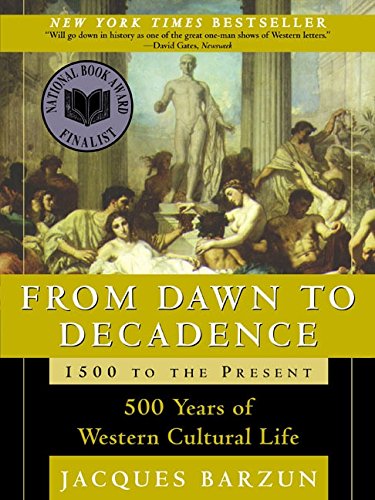Instant classical liberal arts education
Discover the best classical liberal arts books for an instant education. Explore timeless works in philosophy, literature, and history to master the liberal arts quickly and effectively.



Book
The Selfish Gene
by Richard Dawkins
The million copy international bestseller, critically acclaimed and translated into over 25 languages.This 30th anniversary edition includes a new introduction from the author as well as the original prefaces and foreword, and extracts from early reviews. As relevant and influential today as when it was first published, The Selfish Gene has become a classic exposition of evolutionary thought.Professor Dawkins articulates a gene's eye view of evolution - a view giving centre stage to these persistent units of information, and in which organisms can be seen as vehicles for their replication. This imaginative, powerful, and stylistically brilliant work not only brought the insights of Neo-Darwinism to a wide audience, but galvanized the biology community, generating much debate and stimulating whole new areas of research.


Book
A People's History of the United States
by Howard Zinn
Chronicles United States history from a grassroots perspective and provides an analysis of important events from 1492 through the current war on terrorism.

Book
A History of the American People
by Paul Johnson
"The creation of the United States of America is the greatest of all human adventures," begins Paul Johnson's remarkable new American history. "No other national story holds such tremendous lessons, for the American people themselves and for the rest of mankind." Johnson's history is a reinterpretation of American history from the first settlements to the Clinton administration. It covers every aspect of U.S. history--politics; business and economics; art, literature and science; society and customs; complex traditions and religious beliefs. The story is told in terms of the men and women who shaped and led the nation and the ordinary people who collectively created its unique character. Wherever possible, letters, diaries, and recorded conversations are used to ensure a sense of actuality. "The book has new and often trenchant things to say about every aspect and period of America's past," says Johnson, "and I do not seek, as some historians do, to conceal my opinions." Johnson's history presents John Winthrop, Roger Williams, Anne Hutchinson, Cotton Mather, Franklin, Tom Paine, Washington, Adams, Jefferson, Hamilton, and Madison from a fresh perspective. It emphasizes the role of religion in American history and how early America was linked to England's history and culture and includes incisive portraits of Andrew Jackson, Chief Justice Marshall, Clay, Lincoln, and Jefferson Davis. Johnson shows how Grover Cleveland and Teddy Roosevelt ushered in the age of big business and industry and how Woodrow Wilson revolutionized the government's role. He offers new views of Harding, Coolidge, and Hoover and of Franklin Roosevelt's New Deal and his role as commander in chief during World War II. An examination of the unforeseen greatness of Harry Truman and reassessments of Eisenhower, Kennedy, Johnson, Nixon, Reagan, and Bush follow. "Compulsively readable," said Foreign Affairs of Johnson's unique narrative skills and sharp profiles of people. This is an in-depth portrait of a great people, from their fragile origins through their struggles for independence and nationhood, their heroic efforts and sacrifices to deal with the `organic sin' of slavery and the preservation of the Union to its explosive economic growth and emergence as a world power and its sole superpower. Johnson discusses such contemporary topics as the politics of racism, education, Vietnam, the power of the press, political correctness, the growth of litigation, and the rising influence of women. He sees Americans as a problem-solving people and the story of America as "essentially one of difficulties being overcome by intelligence and skill, by faith and strength of purpose, by courage and persistence...Looking back on its past, and forward to its future, the auguries are that it will not disappoint humanity." This challenging narrative and interpretation of American history by the author of many distinguished historical works is sometimes controversial and always provocative. Johnson's views of individuals, events, themes, and issues are original, critical, and admiring, for he is, above all, a strong believer in the history and the destiny of the American people.

Book
The Worldly Philosophers
by Robert L. Heilbroner
The bestselling classic that examines the history of economic thought from Adam Smith to Karl Marx—“all the economic lore most general readers conceivably could want to know, served up with a flourish” (The New York Times). The Worldly Philosophers not only enables us to see more deeply into our history but helps us better understand our own times. In this seventh edition, Robert L. Heilbroner provides a new theme that connects thinkers as diverse as Adam Smith and Karl Marx. The theme is the common focus of their highly varied ideas—namely, the search to understand how a capitalist society works. It is a focus never more needed than in this age of confusing economic headlines. In a bold new concluding chapter entitled “The End of the Worldly Philosophy?” Heilbroner reminds us that the word “end” refers to both the purpose and limits of economics. This chapter conveys a concern that today’s increasingly “scientific” economics may overlook fundamental social and political issues that are central to economics. Thus, unlike its predecessors, this new edition provides not just an indispensable illumination of our past but a call to action for our future.


Book
The March of Folly
by Barbara W. Tuchman
Pulitzer Prize–winning historian Barbara W. Tuchman, author of the World War I masterpiece The Guns of August, grapples with her boldest subject: the pervasive presence, through the ages, of failure, mismanagement, and delusion in government. Drawing on a comprehensive array of examples, from Montezuma’s senseless surrender of his empire in 1520 to Japan’s attack on Pearl Harbor, Barbara W. Tuchman defines folly as the pursuit by government of policies contrary to their own interests, despite the availability of feasible alternatives. In brilliant detail, Tuchman illuminates four decisive turning points in history that illustrate the very heights of folly: the Trojan War, the breakup of the Holy See provoked by the Renaissance popes, the loss of the American colonies by Britain’s George III, and the United States’ own persistent mistakes in Vietnam. Throughout The March of Folly, Tuchman’s incomparable talent for animating the people, places, and events of history is on spectacular display. Praise for The March of Folly “A glittering narrative . . . a moral [book] on the crimes and follies of governments and the misfortunes the governed suffer in consequence.”—The New York Times Book Review “An admirable survey . . . I haven’t read a more relevant book in years.”—John Kenneth Galbraith, The Boston Sunday Globe “A superb chronicle . . . a masterly examination.”—Chicago Sun-Times


